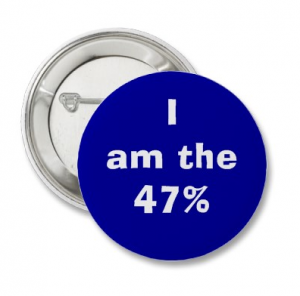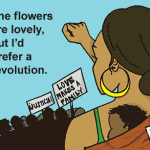Of the many analyses of the 47% of Americans who are dependent on government programs or benefits, or not paying taxes at any one time, the most meaningful one to me is that this is not a fixed group of people. It’s not the same people year to year.
And at one point in time, it’s probably been you. I know it’s been me.
From The Washington Post:
“Politicians and commentators often talk about those who don’t pay income taxes as though they’re in a special club with lifetime membership. In fact, it’s a highly diverse group, some of whom move in and out from year to year.
When they first join the workforce, for example, young people may not earn enough to pay federal income taxes. The same is true for many of the temporarily unemployed, working parents and entrepreneurs whose businesses experience a loss. But most of these people look forward to the day, perhaps in just a year or two, when their incomes will rise and they will join or rejoin the 53 percent of Americans who do pay federal income taxes.
The reverse is true for many senior citizens: They may pay no federal income tax in retirement, but most did during their working years.”
I received a Pell grant when I was a college student. I didn’t receive the money because I was lazy or a victim. Receiving the money didn’t make me dependent. Along with the hard work of my parents and me, it helped make higher education possible. That education eventually made possible the career I now have. That career pays the mortgage, invests in my local community, hires contractors to work on home improvement projects, and foots the tax bill for the students who are now in my classroom receiving those grants themselves. Paying it forward, as Elizabeth Warren pointed out.
The year my husband and I were first married, we received an earned income tax credit. It was the year when we’d both finished master’s degrees, I was starting a doctoral program and working only part-time, and he was still seeking gainful employment in a big new city. Even the small amount that it was, a few hundred dollars, added to my part-time pay and our rapidly dwindling savings pulled us through for another month until he found that first salaried job with benefits. Getting even a small bit of aid made our attempt to forge a family and life together possible and eventually sustainable.
I could go on. Almost anyone could: Infrastructure like the interstate highway system that connects us to family in different states and time zones; federally subsidized student loans that we both received; public K-12 education and public libraries that have educated us. Even the vague notion that there might be Medicare if and when we need it decades from now. (Well, who knows …).
None of this is extraordinary and none of this represents the poverty in which too many Americans live. I’m well aware of how middle class values and systems have surrounded and supported me all of my life. And even in that life, government programs and benefits have been present at key transitional moments. These things did not create a victim or foster dependency. They did help make a lot of other things possible.
Because it’s not about you paying my bills, or me paying your bills. It’s about us. All of us. Together. It’s about basic human decency, respect, and community responsibility. So I can pay taxes to help make possible the Pell grants, earned income tax credits, and public education that your family might need.
And for a candidate whose life has in fact been about supporting people in need and giving to charitable causes through his church, a church that has a vibrant welfare services organization and food supply store house helping those in poverty and in transitional moments, Mitt Romney seems shockingly unconcerned with them as a candidate for President.
Image via.












